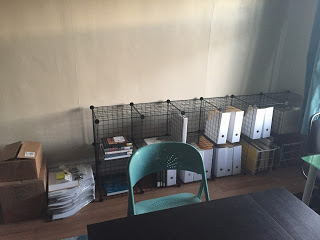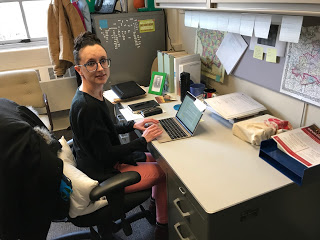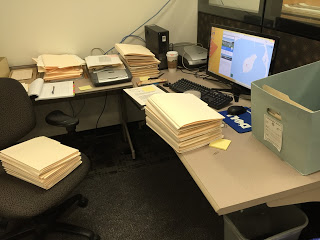I am Margaret Breidenbaugh and This is How I Work
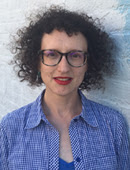 Today I am interviewing Margaret Breidenbaugh for the “How I Work” series. Born and raised in Ohio’s first capital, Chillicothe, Margaret Breidenbaugh completed her undergraduate work in music composition and vocal performance at Capital University in Columbus, Ohio. A search for her German roots necessitated learning to read nineteenth-century German handwriting. An opportunity to process German collections for Cincinnati Museum Center followed. In 2014 Margaret stumbled upon an anonymous travel diary on eBay, a purchase which changed the course of her professional life. After confirming the identity of the writer, Margaret began work on a historical fiction manuscript about German noblewoman Marie von Bonin’s factual 1855 trip to Paris. She received sage advice about this project from Stanley Planton, historical consultant to Dan Brown. As a second-year M.A. History student at Miami University in Oxford, Ohio, Margaret researches nineteenth- and twentieth-century German social and cultural history, especially women’s conceptions of identity and agency. Her current research is a companion to her historical fiction project, and argues that Bonin saw her travels as an opportunity for intellectual and personal growth. Recent training includes an internship at Cincinnati Museum Center with James DaMico, Curator of Photographs and Prints, and a California Rare Book School workshop, “History, Identification, & Preservation of Photographic Materials,” taught by photograph conservator Gawain Weaver. Margaret’s future plans include continuing to teach voice lessons, completing and publishing her novel, and managing an archive or special collections library.
Today I am interviewing Margaret Breidenbaugh for the “How I Work” series. Born and raised in Ohio’s first capital, Chillicothe, Margaret Breidenbaugh completed her undergraduate work in music composition and vocal performance at Capital University in Columbus, Ohio. A search for her German roots necessitated learning to read nineteenth-century German handwriting. An opportunity to process German collections for Cincinnati Museum Center followed. In 2014 Margaret stumbled upon an anonymous travel diary on eBay, a purchase which changed the course of her professional life. After confirming the identity of the writer, Margaret began work on a historical fiction manuscript about German noblewoman Marie von Bonin’s factual 1855 trip to Paris. She received sage advice about this project from Stanley Planton, historical consultant to Dan Brown. As a second-year M.A. History student at Miami University in Oxford, Ohio, Margaret researches nineteenth- and twentieth-century German social and cultural history, especially women’s conceptions of identity and agency. Her current research is a companion to her historical fiction project, and argues that Bonin saw her travels as an opportunity for intellectual and personal growth. Recent training includes an internship at Cincinnati Museum Center with James DaMico, Curator of Photographs and Prints, and a California Rare Book School workshop, “History, Identification, & Preservation of Photographic Materials,” taught by photograph conservator Gawain Weaver. Margaret’s future plans include continuing to teach voice lessons, completing and publishing her novel, and managing an archive or special collections library.
General:
Current Job: 1) Graduate Assistant, Havighurst Special Collections, Miami University; 2) private voice instructor
Current Location: Cincinnati, Ohio
Current mobile device: iPhone
Current computer: Apple 27″ desktop and 12″ laptop
Can you briefly explain your current situation and research to us?
At present I have two jobs, which means I have to be very conservative and efficient with my time. I am a full-time graduate student in the Department of History at Miami University in Oxford, Ohio, I hold a 20-hour-per-week assistantship with Miami U’s Special Collections Library, and I teach private voice lessons part-time. I also volunteer at Cincinnati Museum Center’s Geier Collections and Research Center. I usually have more than one research project going, all of which have to do with German women, identity, and agency in the 19th and 20th centuries. My primary focus is my thesis project, which examines the life of Marie von Bonin, a young noble woman who kept a travel diary during the summer of 1855. I use her diary as evidence of subversion of social norms about women’s experiences with travel, courtship and marriage, and education.
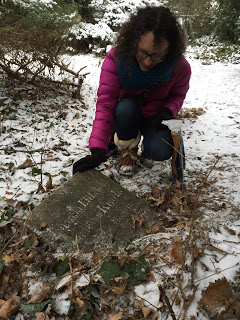 |
| The greatest moment of my research life so far! This is me kneeling beside the final resting place of Marie von Bonin, the young German noblewoman I began researching in 2014 |
What tools, apps and software are essential to your workflow?
I do pretty much everything on Google Drive. I cannot imagine not being able to pull up my work wherever I go. I use Docs for writing and teaching materials (which I convert to Microsoft Word for submissions), Sheets for longterm planning and budgeting, and Slides for conference presentations.
What does your workspace setup look like?
I have four workspaces! All four have a computer. Three have a mug warmer. One has a piano! Since school is on break, my home office is my primary one. I just purchased modular shelving, folders, and small boxes to organize all of my work and personal papers, which are then arranged by subject and chronology on my shelving. My school office is currently a mess, but I decided not to stress about it until classes resume at the end of this month. My voice studio is my third office, and I have a fourth workspace at Cincinnati Museum Center, where I am processing a collection for the photo curator, James DaMico.
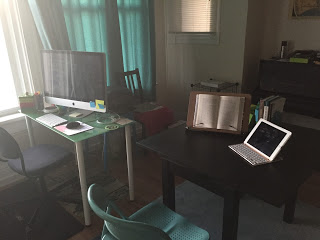 |
| My home office with my two workspaces, a traditional desk for typing and a large table for reading or spreading out research materials |
What is your best advice for productive academic work?
Every night, write out a work plan for the following day. Every Sunday night, sketch out a loose idea of what you want to accomplish during the entire week. If I did not do this, I would let too much unscheduled time get away from me.
How do you keep an overview of projects and tasks?
I use a physical planner to sketch out longterm projects. It is color-coded, of course! Orange is school, green is bills/appointments, purple is teaching voice, light blue is fun stuff. I put due dates on monthly calendars and then write weekly goals on daily pages. I am always looking ahead so there are no surprises.
Besides phone and computer, do you use other technological tools in work and daily life?
I use my iPad in my voice studio to share videos with students. It fits perfectly on a music stand and has a pretty powerful speaker.
Which skill makes you stand out as an academic?
I can read 19th-century German handwriting fluently. I also have extensive formal music and theater training, including paid work as a living history actor. I can sight read almost any sheet music with no issue, which I think would serve me well working as a music librarian (possible future career goal).
What do you listen to when you work?
Nothing. Music is my other, equal passion, and I find myself unable to avoid singing or humming along, even if the music is instrumental. I do like working in noisy coffee shops, however. I find the din helps me focus.
What are you currently reading?
I am not reading anything fun at the moment. I need to get back into the habit. I love a good Harlan Coben novel.
Are you more of an introvert or extrovert? How does this influence your working habits?
I exhibit characteristics of both, and when I feel one way or the other seems to be arbitrary. I am not sure how this affects my work habits, to be honest. Great question that I will ponder!
What’s your sleep routine like?
I drink WAY too much coffee, a behavior I have tried to curb this year with no success, so I tend to get around 5.5-6 hours of sleep a night. This often means I am tired throughout the day, or I let myself sleep in and miss out on precious research and writing time. Definitely something I need to address before spring semester starts!
What’s your work routine like?
I tend to block out 2-3 hours for each activity. I prefer to read in the morning and write in the afternoon. For many people this might seem counterintuitive (better to write when you are at your freshest) but reading comprehension is something I have always struggled with. It takes all receptors firing at once to get the gist of what I’m reading. Writing comes naturally to me, so I don’t stress about it nearly as much.
What’s the best advice you ever received?
Learn to say no! It is okay not to take on every opportunity that comes your way. You’ll enjoy better results with the projects you do take on, and your mental health will thank you for it.

